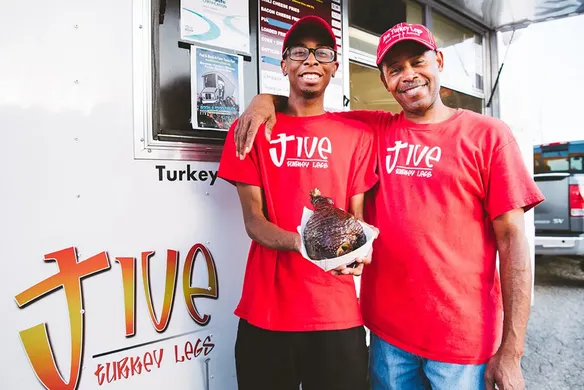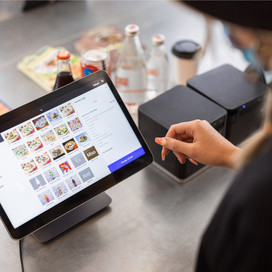Table of contents
Food trucks have become a big part of Australia’s food culture. You’ll find them parked on busy corners, festivals and markets, bringing vibrant flavours and excitement to communities nationwide. In 2025, the food carts and trucks market is worth $650 million – and it’s set to keep growing, thanks to changing tastes, a love of multicultural flavours and easier licensing rules in cities.
They’re a smart, lower-cost way to start a food business, letting you test your dishes and different locations without the big overheads of a restaurant. This guide takes you through the food truck startup costs in Australia and shares tips on how to keep food truck costs manageable as you get rolling.
Licenses, permits, insurance and regulatory costs
Before you start serving up dishes, you’ll need to tick a few legal boxes. These vary between states and territories, so it’s important to check with your local council and state health department early on. Typical costs and requirements include:
|
Licence/permit |
Description |
Cost |
|
Required to legally operate your business in Australia |
Free |
|
|
Food business registration |
Register with your local council to handle and sell food |
$100–$500 yearly |
|
Lets you operate in public spaces like roadsides, parks and markets |
$400–$2,000 yearly |
|
|
Food safety certification (Level 1 & 2) |
Covers basic food handling and hygiene for anyone preparing food |
$60–$200 per person |
|
Gas & electrical safety certificates |
Verifies that your onboard kitchen is safely fitted and compliant |
$150–$350 per issue or yearly renewal |
|
Covers damage or injury claims from third parties |
$600–$1,800 yearly |
|
|
Vehicle insurance |
Commercial vehicle insurance for mobile food trucks |
$1,000–$3,500 yearly |
|
Workers’ compensation insurance |
Covers employees for work-related injuries |
$400–$2,000 yearly |
It’s a good idea to chat with a legal or business advisor to make sure you’re covering all bases. If you’re buying a used food truck, check what’s included and what needs renewing – council permits, insurance policies and certifications are often tied to your vehicle registration.
Renting or buying a food truck
The food truck itself is usually your biggest upfront investment, so it’s worth thinking carefully about how much you want to spend and how long you plan to keep it on the road.
How much does it cost to buy a food truck?
A brand-new, well-equipped food truck might set you back anywhere from $80,000 to $180,000, depending on the size, layout and finishes. Custom-built trucks often sit at the top end of that range but are tailored exactly to your needs, which saves money down the line. Buying can be expensive, but it gives you full control.
If you’re looking to keep startup costs low, a second-hand food truck is a more affordable option, with prices from $35,000 to $85,000, depending on condition and what’s included. Plus, buying used often means hitting the road sooner, especially if the truck’s already fitted out and certified. Just ensure you factor in the cost of any repairs or upgrades, and always get a mechanical inspection before you commit.
How much does it cost to rent a food truck?
If you’re not ready to buy, you can rent or lease a food truck instead. This can cost $2,000–$2,800 per month, depending on size and fit-out. It’s a good option if you’re just testing the waters, running a pop-up or launching as a side hustle. The trade-off? You may have less flexibility with how the truck is set up or what branding you can use.
Should you buy or rent a food truck?
Whether you should buy or rent a food truck depends on your goals. If this is a long-term venture, buying gives you more freedom and can be more cost-effective over time. But if you’re trialling the concept or need a quick setup, renting could be the smarter choice – at least to start with.
Food truck setup, conversion and wrap
If you’re starting with a van or truck shell – or buying second-hand – you’ll likely need to fit it out. Converting a standard vehicle into a fully functional food truck involves installing built-in infrastructure such as power and plumbing systems, ventilation, fire safety systems, lighting, counters, sinks and flooring. Expect to spend $30,000–$60,000 on a full professional fit-out, depending on how complex your setup is and whether you’re using new or refurbished equipment.
Health and safety regulations vary by state and territory, and you may need specific modifications to pass inspection, such as waste disposal systems, food-grade finishes or non-slip flooring. Allocate around $2,000–$8,000 for compliance upgrades, and check local health department requirements early on.
A well-designed truck wrap turns your vehicle into a moving billboard. A full wrap can cost $3,000–$7,000, depending on complexity, size and materials. If that’s not in the budget just yet, consider magnetic signs or painted logos as cheaper alternatives to get you started.
Equipment costs
Whether you’re building your food truck from scratch or upgrading a pre-fitted one, you’ll need to equip it for service. These are the tools and portable appliances you’ll use day to day. Common equipment includes:
- Grills, fryers, stove, electric oven
- Microwave, toaster, kettle
- Fridge, freezer
- Cooking utensils (pots, pans, knives, tongs, chopping boards)
- Protective clothing (aprons, gloves, hairnets)
- Food-grade storage
- Bins with secure lids
Depending on your menu and the quality of your gear, buying equipment might cost $10,000–$25,000. You can also explore refurbished or ex-hire gear for budget-friendly buys – just check warranty terms and food safety compliance. If you’re just getting started, renting some of the bigger appliances lets you test your menu and kitchen layout before making big investments. Hiring also works well for pop-ups, festivals or seasonal operations, with costs typically $400–$800 per day.
Where possible, opt for multi-purpose or space-saving appliances, such as a combination oven or benchtop fryer. Stackable, modular gear also helps you reconfigure your space if your menu evolves.
Inventory and consumables
Stocking up for your first few weeks of trade is exciting – but it’s easy to overdo it. The key is to balance having enough on hand to meet demand, without blowing your budget or wasting food. It’s best to start with just a handful of dishes and focus on getting those right. Refine your recipes, practise preparing them without wastage, and research where you can source ingredients affordably. As you grow, you can gradually add to your menu and increase your ordering quantities – which might also unlock bulk-buy discounts from suppliers.
Expect a little waste as part of the learning curve in your first few months. Keep a close watch on how quickly ingredients move and what’s getting binned. Square Inventory Management can help you track stock levels, flag low inventory and identify patterns so you can fine-tune your orders.
Your ingredient costs depend entirely on your menu, but most new food truck owners spend around $1,500–$5,000 on their first inventory run. This includes pantry staples, perishables and condiments, plus everything you need for prep and service. Don’t forget to budget for the little things: napkins, cutlery, takeaway containers, cups, paper bags, straws, sauce tubs. These add up fast and often need regular restocking. Many food truck operators spend $250–$1,000 per month on packaging, depending on how busy they are.
Staff and labour costs
If you need to find new team members, advertising on job boards like Seek costs around $275 per ad, though you can also recruit through social media or word of mouth for free.
When it comes to pay, the Fast Food Industry Award or Hospitality Industry (General) Award usually applies to food truck workers. Hourly wages start at around $25–$30 per hour for casuals, depending on age, experience, and whether they’re working weekends or public holidays. You’ll also need to pay at least the national minimum wage – including super, leave entitlements and payroll tax if applicable. Don’t forget to budget for your own wage, too (even if it’s modest at the start). There may also be costs to get new staff ready (around $250–$500 per new hire) – think uniforms, training time and any required food safety certifications.
To stay compliant and save time, consider using payroll and staff scheduling tools to manage rosters, timesheets and wage calculations.
Utilities, fuel and operational overheads
Once your truck is up and running, you’ll have a few regular outgoings to keep things ticking along. They’re all manageable with good planning – just bear them in mind when working out your budget.
- Fuel: Unless you’re parked permanently, fuel will be a weekly cost. Most operators spend $70–$150 per week, depending on how far and often they drive.
- Gas and electricity: Gas bottles or generators (or both) are often used to power kitchen equipment. Monthly costs typically fall between $90 and $350, depending on your menu and setup.
- Waste and cleaning: You’ll need regular access to waste disposal and possibly pay for a cleaning service or disposal of grease traps and greywater. Budget around $80–$400 per month.
- Parking and storage: If you need to store your truck somewhere secure overnight or during downtime, parking or storage facility fees may run from $150 to $450 per month.
Maintenance and replacement costs
Even with new equipment, food trucks take a bit of a beating – they’re compact, high-use spaces. Staying on top of maintenance helps keep everything in good nick and prevents minor issues from becoming costly setbacks.
Your truck is both your transport and your kitchen, so regular servicing is essential. Expect to spend around $180–$350 for scheduled visits like oil changes, brake servicing or tyre rotations. Breakdowns can happen, but having money set aside for repairs means you won’t be caught off guard.
Grills, fryers and fridges work hard in tight spaces, so give them regular deep cleans and inspections. Budget around $250–$1,200 per year for servicing or minor repairs. For peace of mind, look for gear that comes with a warranty, or ask suppliers if they offer services to help cover repairs or maintenance.
Wear and tear are part of the job. Knobs loosen, lids crack, tongs go missing. Setting aside a little monthly budget ($50–$100) for small replacements helps avoid last-minute panics and keeps your setup running smoothly.
POS system and technology costs
Taking payments quickly and reliably is crucial for food trucks, especially during busy lunch runs or at events. A good point-of-sale system (POS) combines hardware and software to help speed things up and gives you insights into what’s selling and when.
To accept payments on the go, you’ll need a card reader or EFTPOS terminal. Square offers POS hardware options starting from $65 – from a compact reader that connects to your phone, to an all-in-one register with a customer-facing display.
In addition to processing payments, POS software can also help you build menus, track sales, manage stock and view reports in one place. Square has free food truck POS software that covers the essentials to get started, with optional paid plans if you want to add more advanced features later. Other tools that make running your food truck easier include:
- Online ordering
- QR codes for ordering and payment
- Integration with food delivery platforms
- Loyalty programs
- Invoicing for suppliers
Marketing, branding and signage
Marketing doesn’t need to be expensive, but it should be intentional, especially in the early days. A clear logo, consistent colours and simple typography give a professional feel, while practical signage like menu boards, flags or A-frame signs make you easy to spot at events.
Many customers will discover you online, so it’s worth building a digital presence. Set up a Google Business Profile, website and social media accounts. Ensure people can easily view your menu, hours, location and upcoming events. You can create a professional site quickly with a free website builder, and add features like online ordering or branded merch (like T-shirts, bottled sauces and stickers) down the track.
Whether it’s handing out flyers, teaming up with local events, offering opening-week specials or running an Instagram giveaway, launch promos help you get noticed and bring in your first wave of customers. Expect to spend $100–$500 for digital, social and local event promos, or up to $1,000 with site setup and signage.
Financing and cost-saving strategies
While there are always costs involved in getting a business off the ground, there are plenty of ways to reduce your spend and stretch your budget further:
1. Buy second-hand
From trucks to kitchen equipment, second-hand options are often just as reliable for a fraction of the cost. Just check that they meet food safety and mechanical standards.
2. Use versatile ingredients
A smaller, focused menu with overlapping ingredients and seasonal produce means lower inventory costs, easier prep, less waste and faster service. Many food truck vendors opt for variations of one idea. As well as keeping your costs down, you’ll become a low-waste, greener business.
3. Don’t go overboard
When you’re starting out, err on the side of caution with bought ingredients – it’s better to sell out than watch your money go down the drain. Selling out can even build buzz.
4. Ask your inner circle for help
Have friends or family who can lend a hand? Whether it’s cooking, serving or helping you spread the word, a bit of early support can ease the pressure. It doesn’t have to be forever – just enough to help you figure out your longer-term staffing needs. And if you want to sweeten the deal, consider offering free meals or small perks as a thank-you.
5. Plan your route and location wisely
Licence costs vary widely between councils and states, so it’s worth researching different options. Sometimes, trading in a neighbouring region could mean lower permit fees and be worth the slightly longer drive. Consider scheduling multiple gigs in nearby areas to save on travel and make the most of each trip.
6. Keep stock tight and portions right
Sticking to consistent portion sizes reduces over-serving and keeps ingredient costs in check. Use portion scoops or scales to stay on track. An inventory management tool gives you a clear view of what’s in stock, what’s moving fast and when to reorder, so you’re not left guessing. Less waste means more profit and better sustainability.
7. Buy in bulk with other food trucks
Buying in bulk can slash costs – and you don’t have to do it alone. Team up with other food truck operators to split larger orders of shared ingredients or packaging supplies. It’s a great way to cut expenses for everyone and build community at the same time.
8. Compare suppliers
Whether with your energy supplier or your go-to wholesale food shop, it’s worth reviewing what else is out there. You might find a better deal – or use it to negotiate a lower rate.
9. Leverage free marketing
Tap into word of mouth, local partnerships, community noticeboards and social media. Share regular updates, respond to comments and let your personality shine, both online and in person. These all help build trust, loyalty and repeat business.
10. Take care of your truck and equipment
Regular deep cleans and maintenance checks help avoid major, expensive issues down the line.
11. Access financial support
To help cover food truck startup costs, Australian sellers can explore small business loans, grants or crowdfunding to get started. As you grow, flexible funding options like Square Loans (for eligible sellers) are also available. Repayments are tied to your daily sales, so you pay more when things are busy and less when it’s quiet.
Summary of startup costs
So, how much does it cost to start a food truck in Australia? Here’s a ballpark breakdown of what you might spend to get your business going. Actual costs will vary based on your menu, location and setup – but this gives you a rough idea of what to expect.
|
Category |
Cost |
|
Food truck vehicle |
Buy: $35,000–$180,000 used or new Lease: $2,000–$2,800 per month |
|
Vehicle fit-out, conversion, wrap |
$35,000–$95,000 |
|
Equipment |
Buy: $10,000–$25,000 Rent: $400–800 per day |
|
Licences, permits, insurance |
$2,000–$5,000 per year |
|
Initial food and packaging stock |
$1,750–$6,000 |
|
Branding, signage, marketing |
$100–$9,500 |
|
Staff and labour setup |
$250–$600 per new hire |
|
Utilities, fuel, waste management |
$650–$1,850 per month |
|
POS and tech setup |
|
|
Maintenance and repairs |
$1,500–$3,800 |
There are many benefits to starting a food truck business: freedom, flexibility and the chance to cook for a living, your way. With the right tools, planning and money-wise strategies, running a food truck can be both achievable and rewarding.
The estimated costs in this article were gathered from public sources as of August 2025 and may change over time.
All loans are issued by Square AU Pty. Ltd. (ABN 38 167 106 176). Valid Australian bank account is required. Actual fee depends upon payment card processing history, loan amount and other eligibility factors. A minimum payment of 1/18th of the initial loan balance is required every 60 days and full loan repayment is required within 18 months. Loan eligibility is not guaranteed. Eligibility criteria include consistent and continuous payment card processing through Square. All loans are subject to credit approval. Terms and conditions apply.
![]()













